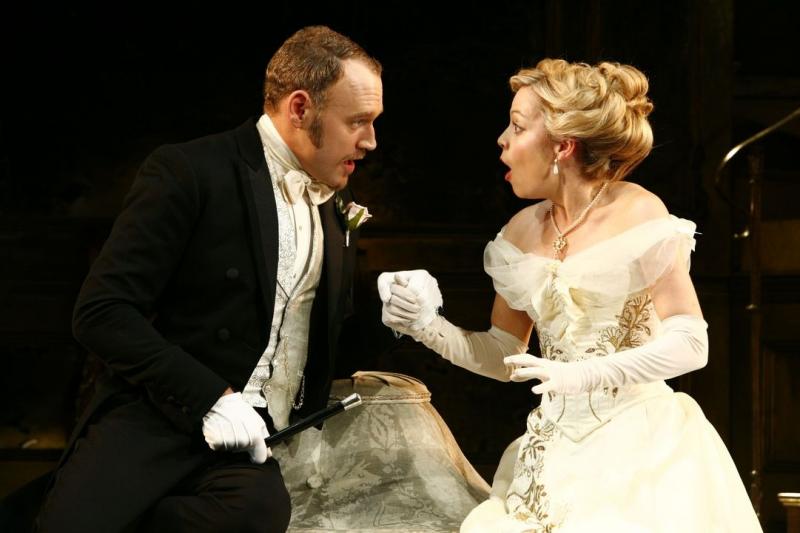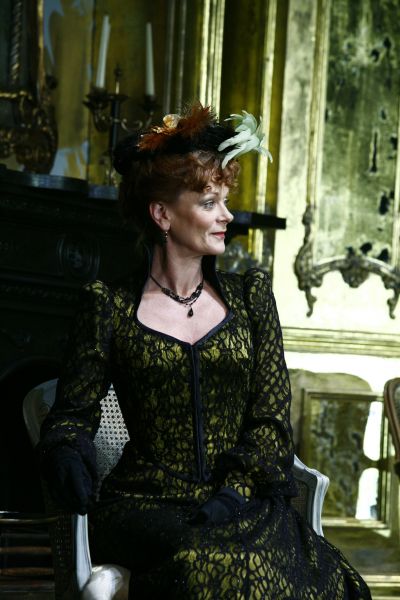An Ideal Husband, Vaudeville Theatre | reviews, news & interviews
An Ideal Husband, Vaudeville Theatre
An Ideal Husband, Vaudeville Theatre
A glittering Wildean gem for the festive season

Directing an Oscar Wilde play is rather like being a chaperone at a party: at best you are invisible, at worst actively intrusive. Marshalling Wilde’s politicos, dandies and duchesses through this latest ball of An Ideal Husband, Lindsay Posner is quick to lose himself among the elegant riot of gilded sets and gorgeous dresses.
Weightier than either Lady Windermere’s Fan or A Woman of No Importance, and less dazzlingly polished than The Importance of Being Earnest, An Ideal Husband is an awkward dramatic creature. Whether it is a political drama masquerading as a drawing-room comedy or vice versa, its two registers must somehow be made to coexist in a tightly scripted world that leaves little space for directorial digression or inspiration.
It’s an issue of scale, and one that Posner and his team come close to solving through carefully judged exaggeration. We open with Stephen Brimson Lewis’s lavish vision for the Chilterns’ Grosvenor Square home, a fanfare of golden domes, pillars and alcoves that doesn’t so much scream wealth as mutter it in a decorous undertone. For the ensuing melodrama to work, the material stakes have to be high indeed; with the aid of Joan Hughes’s costumes, we are left in little doubt of the privilege of the gorgeously plumed inhabitants of this gilded cage.
The sartorial attention to detail is minute: the infamous Mrs Cheveley a kingfisher-blue glint among the muted pastels of her fellows, sporting “far too much rouge and not quite enough clothes” for the company; languid dandy Lord Goring a moustachioed vision in a series of pale-blue and maroon suits, with the further assistance of appropriately “trivial” buttonholes. What a shame then that in the delicate fabric of Wilde’s dialogue there was a six-inch tear courtesy of more stutters and stumbles than a provincial ingénue.
 Whether it was press-night nerves or the want of a few previews, there was a tension to the first-half dialogue that blighted the careful rhythm of Wilde’s prose, failing to frame its wit with the fluidity it deserves. There was a marked shift both in pace and energy after the interval, a promise of things to come, but little consolation for the previous hour’s verbal warm-up.
Whether it was press-night nerves or the want of a few previews, there was a tension to the first-half dialogue that blighted the careful rhythm of Wilde’s prose, failing to frame its wit with the fluidity it deserves. There was a marked shift both in pace and energy after the interval, a promise of things to come, but little consolation for the previous hour’s verbal warm-up.
Stumbles aside, this is a dream cast. Samantha Bond’s caressing huskiness was made for the menacing Mrs Cheveley (pictured right), a woman who pilfers jewels and private correspondence with equal ease, and shakes hands with the outstretched arms of a duellist about to open a bout. Knowing and yet cheapened in her knowledge, Bond is a delicious villain. Matched for commitment by Rachael Stirling’s Lady Chiltern, “pitiless in her perfection”, their coded confrontations of Act One enjoy some of Wilde’s most acerbic dialogue.
Veterans Caroline Blakiston (as the splendidly unreconstructed champion of Old Values, Lady Markby) and Charles Kay (all expostulation and whiskers as the Earl of Caversham) were in danger of walking off with their respective scenes, but were gamely challenged by their younger counterparts. A beautifully judged Mabel Chiltern (“I have no character at all”) came courtesy of Fiona Button, whose silken repartee flowed as elegantly as her skirts.
Investing Lord Goring with a degree of physical comedy unheard of in Wilde, Elliot Cowan makes a splendidly lived-in hero. With a vocabulary of sighs, hunches, shuffles and facial acrobatics (not to mention a fluting falsetto) he finds the human whimsy that is crucial to a figure who on paper is little more than an articulate mouthpiece.
An Ideal Husband will never make an ideal play. It’s tone is too uneven, its conflict too Victorian to really translate into satisfying drama. Yet if Wilde has taught us anything it is that felicity is a more than adequate substitute for profundity, a lesson that Posner and his cast have embraced in all its glossy, glittering superficiality.
- An Ideal Husband at the Vaudeville Theatre until 19 February, 2011
- Find Oscar Wilde on Amazon
Share this article
The future of Arts Journalism
You can stop theartsdesk.com closing!
We urgently need financing to survive. Our fundraising drive has thus far raised £49,000 but we need to reach £100,000 or we will be forced to close. Please contribute here: https://gofund.me/c3f6033d
And if you can forward this information to anyone who might assist, we’d be grateful.

Subscribe to theartsdesk.com
Thank you for continuing to read our work on theartsdesk.com. For unlimited access to every article in its entirety, including our archive of more than 15,000 pieces, we're asking for £5 per month or £40 per year. We feel it's a very good deal, and hope you do too.
To take a subscription now simply click here.
And if you're looking for that extra gift for a friend or family member, why not treat them to a theartsdesk.com gift subscription?
more Theatre
 Mary Page Marlowe, Old Vic review - a starry portrait of a splintered life
Tracy Letts's Off Broadway play makes a shimmeringly powerful London debut
Mary Page Marlowe, Old Vic review - a starry portrait of a splintered life
Tracy Letts's Off Broadway play makes a shimmeringly powerful London debut
 Little Brother, Soho Theatre review - light, bright but emotionally true
This Verity Bargate Award-winning dramedy is entertaining as well as thought provoking
Little Brother, Soho Theatre review - light, bright but emotionally true
This Verity Bargate Award-winning dramedy is entertaining as well as thought provoking
 The Unbelievers, Royal Court Theatre - grimly compelling, powerfully performed
Nick Payne's new play is amongst his best
The Unbelievers, Royal Court Theatre - grimly compelling, powerfully performed
Nick Payne's new play is amongst his best
 The Maids, Donmar Warehouse review - vibrant cast lost in a spectacular-looking fever dream
Kip Williams revises Genet, with little gained in the update except eye-popping visuals
The Maids, Donmar Warehouse review - vibrant cast lost in a spectacular-looking fever dream
Kip Williams revises Genet, with little gained in the update except eye-popping visuals
 Ragdoll, Jermyn Street Theatre review - compelling and emotionally truthful
Katherine Moar returns with a Patty Hearst-inspired follow up to her debut hit 'Farm Hall'
Ragdoll, Jermyn Street Theatre review - compelling and emotionally truthful
Katherine Moar returns with a Patty Hearst-inspired follow up to her debut hit 'Farm Hall'
 Troilus and Cressida, Globe Theatre review - a 'problem play' with added problems
Raucous and carnivalesque, but also ugly and incomprehensible
Troilus and Cressida, Globe Theatre review - a 'problem play' with added problems
Raucous and carnivalesque, but also ugly and incomprehensible
 Clarkston, Trafalgar Theatre review - two lads on a road to nowhere
Netflix star, Joe Locke, is the selling point of a production that needs one
Clarkston, Trafalgar Theatre review - two lads on a road to nowhere
Netflix star, Joe Locke, is the selling point of a production that needs one
 Ghost Stories, Peacock Theatre review - spirited staging but short on scares
Impressive spectacle saves an ageing show in an unsuitable venue
Ghost Stories, Peacock Theatre review - spirited staging but short on scares
Impressive spectacle saves an ageing show in an unsuitable venue
 Hamlet, National Theatre review - turning tragedy to comedy is no joke
Hiran Abeyeskera’s childlike prince falls flat in a mixed production
Hamlet, National Theatre review - turning tragedy to comedy is no joke
Hiran Abeyeskera’s childlike prince falls flat in a mixed production
 Rohtko, Barbican review - postmodern meditation on fake and authentic art is less than the sum of its parts
Łukasz Twarkowski's production dazzles without illuminating
Rohtko, Barbican review - postmodern meditation on fake and authentic art is less than the sum of its parts
Łukasz Twarkowski's production dazzles without illuminating
 Lee, Park Theatre review - Lee Krasner looks back on her life as an artist
Informative and interesting, the play's format limits its potential
Lee, Park Theatre review - Lee Krasner looks back on her life as an artist
Informative and interesting, the play's format limits its potential
 Measure for Measure, RSC, Stratford review - 'problem play' has no problem with relevance
Shakespeare, in this adaptation, is at his most perceptive
Measure for Measure, RSC, Stratford review - 'problem play' has no problem with relevance
Shakespeare, in this adaptation, is at his most perceptive

Add comment